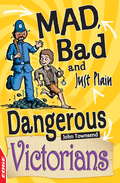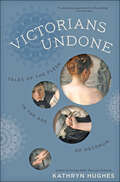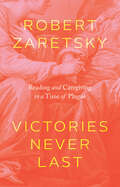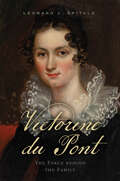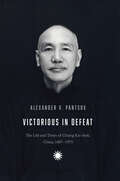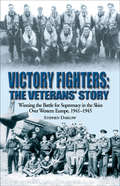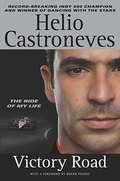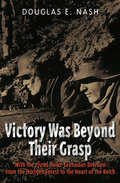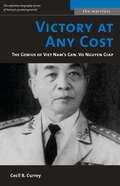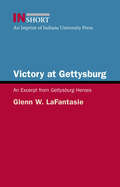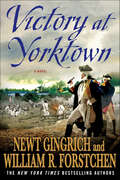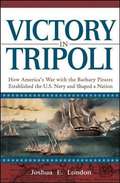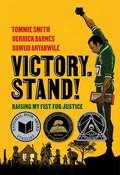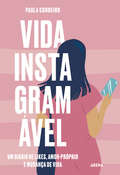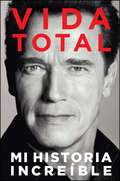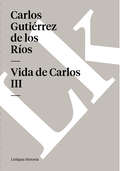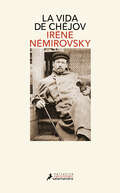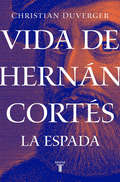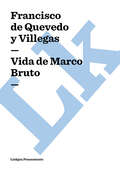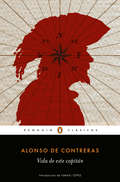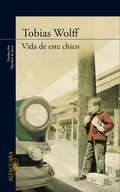- Table View
- List View
Victorians (EDGE: Mad, Bad and Just Plain Dangerous #3)
by John TownsendTime to take a sideways look at the bizarre and outrageous from throughout history - and it's all TRUE!Which new material got the Victorians building mad?Who was the bad guy that committed terrible crimes in London?Which dangerous job was banned for boys under 10?Find out the answers to these questions inside, along with lots of facts, quizzes, and other bonkers stuff as you take a bumpy journey into the darkest crannies of Victorian history with Mad, Bad and Just Plain Dangerous!
Victorians Undone: Tales of the Flesh in the Age of Decorum
by Kathryn HughesA fascinating account of what it was like to live in a Victorian body from best-selling historian and critic Kathryn Hughes.In Victorians Undone, renowned British historian Kathryn Hughes follows five iconic figures of the nineteenth century as they encounter the world not through their imaginations or intellects but through their bodies. Or rather, through their body parts. Using the vivid language of admiring glances, cruel sniggers, and implacably turned backs, Hughes crafts a narrative of cinematic quality by combining a series of truly eye-opening and deeply intelligent accounts of life in Victorian England.Lady Flora Hastings is an unmarried lady-in-waiting at young Queen Victoria's court whose swollen stomach ignites a scandal that almost brings the new reign crashing down. Darwin's iconic beard provides important new clues to the roles that men and women play in the great dance of natural selection. George Eliot brags that her right hand is larger than her left, but her descendants are strangely desperate to keep the information secret. The poet-painter Dante Gabriel Rossetti, meanwhile, takes his art and his personal life in a new direction thanks to the bee-stung lips of his secret mistress, Fanny Cornforth. Finally, we meet Fanny Adams, an eight-year-old working-class girl whose tragic evisceration tells us much about the currents of desire and violence at large in the mid-Victorian countryside. While 'bio-graphy' parses as 'the writing of a life,' the genre itself has often seemed willfully indifferent to the vital signs of that life—to breath, movement, touch, and taste. Nowhere is this truer than when writing about the Victorians, who often figure in their own life stories as curiously disembodied. In lively, accessible prose, Victorians Undone fills the space where the body ought to be, proposing new ways of thinking and writing about flesh in the nineteenth century.
Victories Never Last: Reading and Caregiving in a Time of Plague
by Robert ZaretskyA timely and nuanced book that sets the author’s experience as a nursing home volunteer during the pandemic alongside the wisdom of great thinkers who confronted their own plagues. In any time of disruption or grief, many of us seek guidance in the work of great writers who endured similar circumstances. During the first year of the COVID-19 pandemic, historian and biographer Robert Zaretsky did the same while also working as a volunteer in a nursing home in south Texas. In Victories Never Last Zaretsky weaves his reflections on the pandemic siege of his nursing home with the testimony of six writers on their own times of plague: Thucydides, Marcus Aurelius, Michel de Montaigne, Daniel Defoe, Mary Shelley, and Albert Camus, whose novel The Plague provides the title of this book. Zaretsky delves into these writers to uncover lessons that can provide deeper insight into our pandemic era. At the same time, he goes beyond the literature to invoke his own experience of the tragedy that enveloped his Texas nursing home, one which first took the form of chronic loneliness and then, inevitably, the deaths of many residents whom we come to know through Zaretsky’s stories. In doing so, Zaretsky shows the power of great literature to connect directly to one’s own life in a different moment and time. For all of us still struggling to comprehend this pandemic and its toll, Zaretsky serves as a thoughtful and down-to-earth guide to the many ways we can come to know and make peace with human suffering.
Victories Never Last: Reading and Caregiving in a Time of Plague
by Robert ZaretskyA timely and nuanced book that sets the author’s experience as a nursing home volunteer during the pandemic alongside the wisdom of great thinkers who confronted their own plagues. In any time of disruption or grief, many of us seek guidance in the work of great writers who endured similar circumstances. During the first year of the COVID-19 pandemic, historian and biographer Robert Zaretsky did the same while also working as a volunteer in a nursing home in south Texas. In Victories Never Last Zaretsky weaves his reflections on the pandemic siege of his nursing home with the testimony of six writers on their own times of plague: Thucydides, Marcus Aurelius, Michel de Montaigne, Daniel Defoe, Mary Shelley, and Albert Camus, whose novel The Plague provides the title of this book. Zaretsky delves into these writers to uncover lessons that can provide deeper insight into our pandemic era. At the same time, he goes beyond the literature to invoke his own experience of the tragedy that enveloped his Texas nursing home, one which first took the form of chronic loneliness and then, inevitably, the deaths of many residents whom we come to know through Zaretsky’s stories. In doing so, Zaretsky shows the power of great literature to connect directly to one’s own life in a different moment and time. For all of us still struggling to comprehend this pandemic and its toll, Zaretsky serves as a thoughtful and down-to-earth guide to the many ways we can come to know and make peace with human suffering.
Victorine du Pont: The Force behind the Family (Cultural Studies of Delaware and the Eastern Shore)
by Leonard C. SpitaleVictorine Elizabeth du Pont, the first child of Eleuthère Irénée du Pont and his wife Sophie, was seven years old when her family emigrated to America, where her father established the humble beginnings of what would become a corporate giant. Through correspondence with friends and relatives from the ages of eight to sixty-eight, Victorine unwittingly chronicled the first sixty years of the du Pont saga in America. As she recovered from personal tragedy, she became first tutor of her siblings and relations. This biography makes the case that Victorine has had the broadest—and most enduring—influence within the entire du Pont family of any family member. The intellectual heir of her venerable grandfather, Pierre Samuel du Pont de Nemours, although Victorine grew up in an age where women's opportunities were limited, her pioneering efforts in education, medicine, and religion transformed an entire millworkers’ community.
Victorious in Defeat: The Life and Times of Chiang Kai-shek, China, 1887-1975
by Alexander V. PantsovAn extensively researched, comprehensive biography of Chinese Nationalist leader Chiang Kai-shek, one of the twentieth century&’s most powerful and controversial figures Chiang Kai-shek (1887–1975) led the Republic of China for almost fifty years, starting in 1926. He was the architect of a new, republican China, a hero of the Second World War, and a faithful ally of the United States. Simultaneously a Christian and a Confucian, Chiang dreamed of universal equality yet was a perfidious and cunning dictator responsible for the deaths of over 1.5 million innocent people. This critical biography is based on Chiang Kai-shek&’s unpublished diaries, his extensive personal files from the Russian archives, and the Russian files of his relatives, associates, and foes. Alexander V. Pantsov sheds new light on the role played by the Russians in Chiang&’s rise to power in the 1920s and throughout his political career—and indeed the Russian influence on the Chinese revolutionary movement as a whole—as well as on Chiang&’s complex relationship with top officials of the United States. It is a detailed portrait of a man who ranks with Stalin, Roosevelt, Hitler, Churchill, and Gandhi as leaders who shaped our world.
Victory Fighters: Winning the Battle for Supremacy in the Skies Over Western Europe, 1941–1945
by Stephen DarlowA collection of eyewitness accounts of the struggle that raged in the skies over occupied Europe after the Battle of Britain during World War II. Expertly selected and interwoven by Stephen Darlow, Victory Fighters centers on the stories of six pilots and one navigator, the telling of which covers every aspect of this battle over land and sea. The author describes and analyzes the relevant command decisions from the highest level down, and against this background the men give their accounts from the start of their flying careers through to the preparations for operation Overlord, the invasion itself, the liberation of France, the crossing of the Rhine, to the end of the war in Europe on VE-Day. Through their eyes, the reader is introduced to a series of different tasks and situations, a multitude of aircraft types—Sunderlands, Mustangs, Tempests, Typhoons, Spitfires, Whirlwinds, Mosquitoes—and a great many squadrons. Having conducted numerous interviews and undertaken diligent research of documents, diaries and correspondence, the author has produced a fitting testament to these men and the countless others they represent.
Victory Over Trials: Encouragement From the Life of Job
by Lottie B. Hobbs[from the back page] If you have ever experienced discouragement, disappointment, pain, grief, doubt, or any other heartache, this book is for you. The author gleans enlightenment, strength, and direction from the most magnificent and soul-stirring drama of all time: the Book of Job. Job - an emotionally torn, suffering, grieving man - grappled with life's heaviest burdens and most perplexing questions. He triumphed! So can we! Victory Over Trials is not a tedious analysis. It is easily understood, up-to-date, and practical. Ideal for individual and class use. One reader concludes: "Each chapter is worth the price of the book." LOTTIE BETH HOBBS is acclaimed in international journals in the U.S. and Europe as a writer, speaker, and editor. Some of her books have had more than twenty printings in English and are still in demand. Some have been published in Spanish, French, Portuguese, and several languages of India. Many of her popular pamphlets, on a wide variety of topics, are distributed internationally.
Victory Road
by Roger Penske Helio CastronevesThe Indianapolis 500 champion and winner of season five's Dancing with the Stars shares his heartfelt story about determination, family, justice, and beating all odds to win. With his signature victory celebration of climbing the fence after taking the checkered flag and his radiant performances that earned him the coveted crystal ball trophy on Dancing with the Stars, Helio's infectious enthusiasm garnered the admiration of millions of fans-both on and off the track. Therefore no one, including him, could have predicted that one day he would sit in a federal court along with his sister/manager facing 10 years in jail. After his grueling trial-where justice prevailed and charges were dropped-Helio learned more than ever before about his family, true friends, faith, and the road to victory. In this book, Helio Castroneves tells his resilient story about his greatest accomplishments, most devastating experiences, becoming a father, and valuing what is truly important in life.
Victory Was Beyond Their Grasp: With the 272nd Volks-Grenadier Division from the Huertgen Forest to the Heart of the Reich
by Douglas E. Nash Sr.&“For both students of the German Army in World War II as well as those interested in the late 1944 campaign, this is a must-read&” (The NYMAS Review). As the Allies were approaching the German frontier at the beginning of September 1944, the German Armed Forces attempted to regain the strategic initiative. While the &“wonder weapons,&” such as the V-1 flying bomb, the V-2 missile, and the Messerschmitt Me-262 jet fighter, are widely recognized as being the most prominent of these initiatives upon which Germany pinned so much hope, the Volks-Grenadier Divisions (VGDs) are practically unknown. Often confused with the Volkssturm, the Home Guard militia, VGDs have suffered an undeserved reputation as second-rate formations filled with young boys and old men suited to serve only as cannon fodder. This groundbreaking book, now in a new edition, shows that VGDs were actually conceived as a new, elite corps loyal to the National Socialist Party composed of men from all branches of Hitler&’s Wehrmacht and equipped with the finest ground combat weapons available. Whether fighting from defensive positions or spearheading offensives such as the Battle of the Bulge, VGDs initially gave a good account of themselves in battle. Using previously unpublished unit records, Allied intelligence and interrogation reports, and, above all, interviews with survivors, the author has crafted an in-depth look at a late-war German infantry company, including many photographs from the veterans themselves. In this book we follow along with the men of the 272nd VGD&’s Fusilier Company from their first battles in the Hürtgen Forest to their final defeat in the Harz Mountains. Along the way, we learn the enormous potential of VGDs—and feel their soldiers&’ heartbreak at their failure.
Victory at Any Cost: The Genius of Viet Nam's Gen. Vo Nguyen Giap
by Cecil B. CurreyMany people do not understand why America lost the Viet Nam War. Author Cecil B. Currey makes one primary reason clear: North Viet Nam's Senior Gen. Vo Nguyen Giap. Victory at Any Cost tells the full story of the man who fought three of the world's great powers—and beat them all.
Victory at Gettysburg: An Excerpt from Gettysburg Heroes
by Glenn W. LaFantasieA collection of personal accounts from key figures in the battle of Gettysburg.The Civil War generation saw its world in ways startlingly different from our own. Glenn W. LaFantasie examines the lives and experiences of several key personalities who gained fame during the war. As a turning point in the war, Gettysburg had a different effect on each person. Victory at Gettysburg captures the human drama of the war and shows how this group of individuals endured or succumbed to the war and, willingly or unwillingly, influenced its outcome. At the same time, it shows how the war shaped the lives of these individuals, putting them through ordeals they never dreamed they would face or survive. The battle of Gettysburg is the thread that ties these Civil War lives together.“Glenn LaFantasie is one of the finest writers in the field of Civil War history. His prose is accessible, pleasurable to read, and always insightful and provocative . . . this book should excite a lot of interest.” —Joan Waugh, editor of The Memory of the Civil War in American Culture
Victory at Yorktown: A Novel (George Washington Series #3)
by Newt Gingrich William R. ForstchenNew York Times bestselling authors Newt Gingrich and William R. Forstchen pen the triumphant conclusion to their George Washington series-a novel of leadership, brotherhood, loyalty, and the victory of the American Revolutionary cause.1781. After three years in a bitter stalemate, General Washington decides to embark on one of the most audacious moves in American military history. He will take nearly his entire army out of New Jersey and New York and force march it more than three hundred miles in complete secrecy. He must pray that the French navy is successful in blockading Chesapeake Bay, so that he can fall upon British General Cornwallis at Yorktown. It is a campaign laden with "Ifs" but the deadlock must be broken, otherwise the American spirit, after six long years of war, will crumble.A tour de force narrative of one of America's most important heroes, Victory at Yorktown vividly portrays Washington's unparalleled courage, determination, and patriotism as he leads his professional army, once a "rabble in arms," to the heat of the Battle of Yorktown to execute the Revolution's most decisive contest.
Victory in Tripoli: How America's War with the Barbary Pirates Established the U. S. Navy and Shaped a Nation
by Joshua E. LondonAt the dawn of a new century, a newly elected U. S. president was forced to confront an escalating series of unprovoked attacks on Americans by Muslim terrorists sworn to carry out jihad against all Western powers. As timely and familiar as these events may seem, they occurred more than two centuries ago. The president was Thomas Jefferson, and the terrorists were the Barbary pirates. Victory in Tripoli recounts the untold story of one of the defining challenges overcome by the young U. S. republic. This fast-moving and dramatic tale examines the events that gave birth to the Navy and the Marines and re-creates the startling political, diplomatic, and military battles that were central to the conflict. This highly interesting and informative history offers deep insight into issues that remain fundamental to U. S. foreign policy decisions to this day.
Victory. Stand!: Raising My Fist For Justice
by Derrick Barnes Tommie Smith Dawud AnyabwileLonglisted for the 2022 National Book Award for Young People's Literature A groundbreaking and timely graphic memoir from one of the most iconic figures in American sports—and a tribute to his fight for civil rights. On October 16, 1968, during the medal ceremony at the Mexico City Olympics, Tommie Smith, the gold medal winner in the 200-meter sprint, and John Carlos, the bronze medal winner, stood on the podium in black socks and raised their black-gloved fists to protest racial injustice inflicted upon African Americans. Both men were forced to leave the Olympics, received death threats, and faced ostracism and continuing economic hardships. In his first-ever memoir for young readers, Tommie Smith looks back on his childhood growing up in rural Texas through to his stellar athletic career, culminating in his historic victory and Olympic podium protest. Cowritten with Newbery Honor and Coretta Scott King Author Honor recipient Derrick Barnes and illustrated with bold and muscular artwork from Emmy Award–winning illustrator Dawud Anyabwile, Victory. Stand! paints a stirring portrait of an iconic moment in Olympic history that still resonates today.
Vida Instagramável: Um diário de likes, amor próprio e mudança de vida
by DOS SANTOS CORDEIRO MENDES, PAULA ILikes. Poses. Cenários perfeitos tirados como por magia de outros bem caóticos. Seguidores. Influencers. Este livro é, ao mesmo tempo, um guia do que não fazer no Instagram, um manual para uma vida melhor e um grito de liberdade. Paula Cordeiro criou o Instagram Urbanista para provar que era possível reinventar-se profissionalmente. A ideia era explorar um novo mundo de negócio transformando as suas paixões em trabalho: escrever, moda, cultura, comunicação. Mas falhou. Seguiu todos os passos que era suposto, estudou todos os meandros das redes sociais e do comportamento humano nessas redes, comprou likes, usou todas as estratégias para ganhar seguidores, definiu hashtags e publicou às horas mais populares para conseguir mais alcance. Tirava fotografias sempre que o cenário era propício, horas a treinar poses despreocupadas mesmo durante as férias em família. O telemóvel ia com ela para todo o lado, às vezes às escondidas. Tornou-se um vício, um peso e um stress constante. E depois de um burnout pegou nesses likes e transformou-os em amor próprio, fazendo do seu maior fracasso, o maior sucesso. Este livro não é só o relato dessa aventura, mas um manual de entendimento do sucesso no Instagram - com todos os truques e segredos obscuros.
Vida Total: Mi Historia Increíble
by Arnold SchwarzeneggerLA MEJOR HISTORIA DE INMIGRACIÓN DE NUESTROS TIEMPOSSu historia es única, divertida, y en estas páginas la cuenta de manera brillante. Nació durante un año de hambruna en un pequeño pueblo de Austria, hijo de un jefe de policía muy austero. Soñaba con mudarse a los Estados Unidos para convertirse en campeón del fisiculturismo y estrella de cine. A los veintiún años vivía en Los Ángeles y ya había sido coronado como Mr. Universo. Cinco años más tarde había aprendido a hablar inglés y se había convertido en el mejor fisiculturista del mundo. Diez años más tarde había completado su título universitario y se había vuelto millonario gracias a sus empresas comerciales en el sector inmobiliario, el paisajismo y el fisiculturismo. También había ganado un Golden Globe por su debut como actor dramático en Stay Hungry. Veinte años más tarde era la estrella de cine más famosa del mundo, estaba casado con Maria Shriver y era un líder republicano emergente que formaba parte de la familia Kennedy. Treinta y seis años después de haber llegado a los Estados Unidos, el hombre que alguna vez fue conocido entre sus compañeros fisiculturistas como el "roble austriaco" fue elegido como gobernador de California, la séptima economía más grande del mundo. Gobernó el estado a lo largo de una crisis presupuestaria, desastres naturales y disturbios políticos, trabajando con ambos lados del espectro político para crear un mejor ambiente, reformas electorales y soluciones bipartidistas. Con Maria Shriver crió a cuatro hijos fantásticos. En medio del escándalo que él mismo creó, intentó mantener a su familia unida. Hasta ahora nunca ha contado la historia completa de su vida, en su propia voz. Éste es Arnold. Ésta es su vida total.
Vida de Carlos III
by Carlos Gutiérrez de los Ríos«Después de haber superado gloriosamente nuestro Monarca, el Sr. D. Felipe V, todos los obstáculos que se opusieron a sus justos derechos a la Corona de España, y de haber asegurado la sucesión a esta monarquía con dos hijos, Luis y Fernando, nacidos de una princesa de Saboya que, por sus virtudes, talento y conducta debiera haber sido inmortal, quiso la Providencia probar la constancia y resignación de este gran monarca arrebatándola de su lado.No obstante el justo dolor que ocasionó a este Soberano su pérdida, haciendo nuevamente uso de aquella firmeza que tenía tan acreditada a la nación entera en las fatigas de una larga y penosa guerra, creyó no deberla exponer nuevamente a otra igual, dejando abandonada la sucesión de la Corona a las vidas de solo dos tiernos hijos, y resolvió contraer nuevo matrimonio con la Princesa heredera de Parma, doña Isabel Faunesco, reuniendo por este medio a los derechos que la Corona de España tenía a la de Portugal los de la augusta casa de Faunesco, superiores aún a los de Felipe II y a los de la casa reinante de Saboya.»
Vida de Chéjov
by Irène NémirovskyUna biografía que ilumina la figura de Antón Chéjov en toda su verdad, humanidad y sensibilidad excepcional. La nostalgia de la inocencia, el retrato sin concesiones de una humanidad que sufre: numerosas son las afinidades que unen la obra de Irène Némirovsky con la de Antón Chéjov. Nacida en 1903, un año antes de la muerte de este, la autora de Suite francesa quedó prendada por la trayectoria y el destino del célebre escritor ruso. Precisa, íntima y profundamente conmovedora, esta biografía, que es también una magnífica panorámica de la literatura rusa, revela la compleja personalidad de Chéjov, con todos sus padecimientos, anhelos, frustraciones y esperanzas. Publicada en 1946, cuatro años después de la trágica desaparición de Irène Némirovsky, Vida de Chéjov evoca las extraordinarias coincidencias entre dos almas sorprendentemente afines. La crítica ha dicho...«Irène Némirovsky posee la fuerza de un Balzac o un Dostoievski.»Neue Zürcher Zeitung «Una escritora que crea adicción.»El País «La pluma de Némirovsky regala descripciones sugerentes y divertidas, para arrojar una alegría infantil a los primeros y lóbregos años del futuro escritor. [...]. Una combinación agridulce de gloria y desencanto. Como cualquier buen cuento ruso.»El Confidencial
Vida de Hernán Cortés: La espada
by Christian Duverger«Es ésta una de las biografías cortesianas mejor escritas. Su visión de Cortés, positiva a toda costa, sorprenderá o encantará a sus lectores.» José Luis Martínez Se cumplen cinco siglos de la Conquista de México, y a lo largo de este tiempo Hernán Cortés ha desempeñado un claro papel en el imaginario colectivo de la nación: el de villano. Sin embargo, para Christian Duverger esta apreciación no podría ser más injusta. Lejos del ambicioso y sanguinario invasor que los libros de texto han urdido, el historiador francés presenta en esta biografía en dos tomos a un humanista, un hombre de armas y de letras que vio en las tierras americanas la posibilidad, no de trasplantar una copia de la sociedad castellana, sino de inventar un mundo nuevo. Para Cortés, el mestizaje era la clave de este proyecto cultural. Publicada por primera vez en2005, la primera parte de esta biografía cortesiana retrata, desde luego, al conquistador fascinado por el mundo indígena, pero también al interlocutor y competidor de Carlos V, al seductor, al independentista, al empresario, al introductor de la caña de azúcar y el gusano de seda en México, al explorador que descubre California, que comercia con el Perú y que llega hasta las Filipinas. La espada narra, así, la parte pública de la vida del padre de la patria.
Vida de Hernán Cortés: La pluma
by Christian Duverger«Sustentado por una apreciable información documental, el asombroso libro de Christian Duvergerrinde a Cortés escritor un merecido homenaje.» Bartolomé Bennassar Se cumplen cinco siglos de la Conquista de México, y a lo largo de este tiempo Hernán Cortés ha desempeñado un claro papel en el imaginario colectivo de la nación: el de villano. Sin embargo, para Christian Duverger esta apreciación no podría ser más injusta. Lejos del ambicioso y sanguinario invasor que los libros de texto han urdido, el historiador francés presenta en esta biografía en dos tomos a un humanista, un hombre de armas y de letras que vio en las tierras americanas la posibilidad, no de trasplantar una copia de la sociedad castellana, sino de inventar un mundo nuevo. Para Cortés, el mestizaje era la clave de este proyecto cultural. Publicada por primera vez en 2013, bajo el título de Crónica de la eternidad, esta segunda parte de la biografía cortesiana causó un gran revuelo al desmontar la autoría de Bernal Díaz del Castillo sobre la Historia verdadera de la conquista de la Nueva España y devolvérsela a su verdadero dueño: Hernán Cortés. La pluma nos presenta a un Cortés cronista de sí mismo, un escritor que supo fundar su legado a través de un magistral artificio literario: un auténtico conquistador de la memoria.
Vida de Lazarillo Tormes
by AnónimoA fictional story of a street boy's apprenticeship to a blind beggar, a miserly priest, a bankrupt gentleman. Lazarillo's tale is a wicked satire of venality, pretense, and brazen self-seeking.
Vida de Marco Bruto
by Francisco de Quevedo y VillegasLa Vida de Marco Bruto es un ensayo de reflexión política en el que se glosa la vida del célebre asesino de César escrita por Plutarco.
Vida de este capitán
by Alonso De ContrerasLos mejores libros jamás escritos. «[...] El capitán mandó que todos los heridos subiesen arriba a morir, porque dijo "Señores, o a cenar con Cristo o a Constantinopla".» En el decadente Imperio español de los últimos Austrias, con más frentes abiertos de los que finalmente pudieron contenerse, afloró un nuevo tipo de soldado: el miliciano de dudosa extracción, pendenciero y predispuesto al saqueo. Uno de aquellos soldados fue Alonso de Guillén, más conocido como capitán Alonso de Contreras, que narra en este libro, con minuciosa exactitud y feroz naturalidad, las peripecias y recovecos de su vida y su oficio. Esta asombrosa sucesión de duelos, abordajes, temporales, combates y episodios cortesanos conforma el impagable testimonio del carácter y la vida de los soldados profesionales de la España de su tiempo. Esta magnífica biografía, una pieza única de nuestra literatura que nos acerca a la vida de un hombre de armas, viene acompañada de una introducción de Ismael López Martín, profesor en el departamento de didáctica de las lenguas y de las ciencias humanas y sociales de la Universidad de Zaragoza.
Vida de este chico (Alfaguara Bolsillo Ser.)
by Tobias WolffEn Vida de este chico, Tobias Wolff narra sus recuerdos de niño y adolescente, cuando, divorciados sus padres, recorría con su madre con la que formaba una auténtica «pareja telepática» las carreteras de Estados Unidos de un lado a otro del país. Toby o Jack, como le gusta llamarse a sí mismo en homenaje a su adorado Jack London absorberá entre mapas, whisky, peleas a puñetazos, amistades y traiciones, la esencia de esa América de los años cincuenta que marcará irremediablemente su juventud. Una juventud con toques minimalistas y dickensianos a un tiempo y que sirve aquí a su autor para trazar con humor y ternura el retrato de un tiempo pasado en el espejo de su propia imagen.
